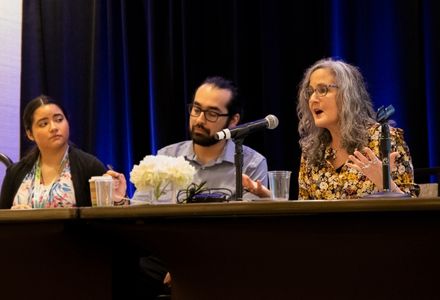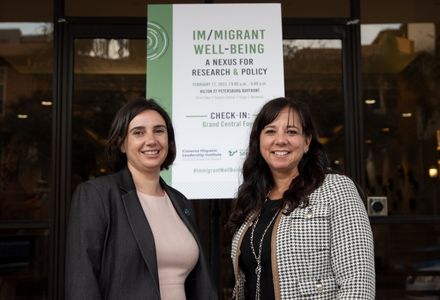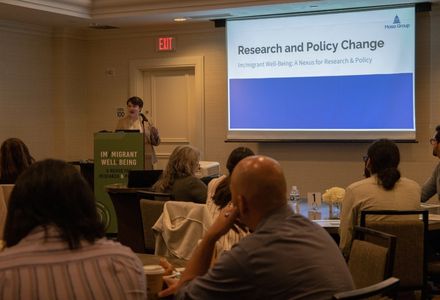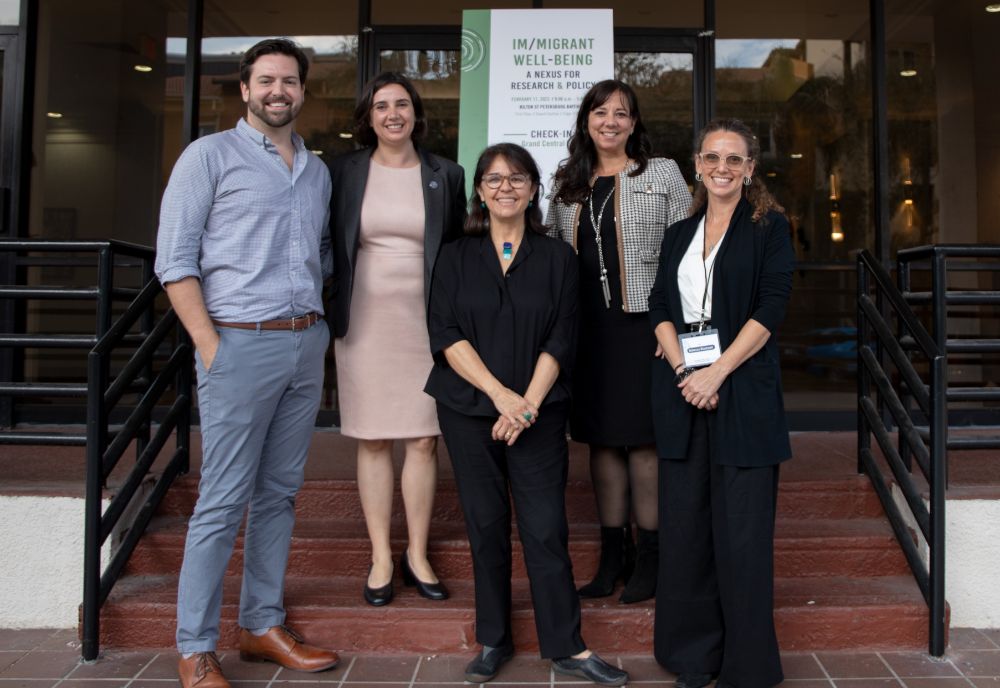The USF College of Arts and Sciences’ Im/migrant Well-Being Research Center and co-sponsor Cisneros Hispanic Leadership Institute at The George Washington University (GWU) hosted the inaugural biennial conference, “Im/migrant Well-Being: A Nexus for Research & Policy” at the Hilton, St. Petersburg on February 17-18.
The two-day conference, which was open to a broad audience of community partners, brought together more than a dozen scholars from across the country to focus on how policies, programs, and interventions at various levels of government, could best foster well-being in im/migrant communities.

Scholars and experts participating in panels and engaged in discussion. (Photo courtesy of Johanna Cajina)
Scholars representing a variety of disciplinary backgrounds, such as anthropology, sociology, political science, criminal justice, and education, among others, presented their work on a range of issues, including matters related to Title 42’s impact on asylum seekers, electronic monitoring device’s effects on the parent-child relationship in immigrant families, border agents search procedures and educational curricula that can best enhance the well-being of immigrant children, among other topics. Together, these presentations highlighted policy and programmatic interventions, that, if adopted, could improve the well-being of immigrants and their children.
The public launch of the Im/migrant Well-Being Research Center (IWRC) was a highlight of this year’s conference.
Leading the new center, whose vision is to serve as an inclusive academic research model on im/migrant experiences that translate into real-world impact for the well-being of individuals and communities, are Dr. Elizabeth Aranda, a professor in the Department of Sociology & Interdisciplinary Social Sciences, and Dr. Rebecca Blackwell, a post-doctoral fellow for the center.
“The mission of the center is to produce high-quality research on the various dimensions of im/migrant well-being and to make those findings accessible to policymakers,” said Aranda. “As scholars, many of us are trained to write for academic audiences, but when our research holds policy suggestions that could help the populations and communities that we study, we want to understand how we can translate those findings to speak to those making the decisions.”

Dr. Elizabeth Vaquera (left) and Dr. Elizabeth Aranda (right). (Photo courtesy of Johanna Cajina)
Representative Kathy Castor, of Florida’s 14th Congressional district, who opened the first day of the conference, emphasized the importance of peer-reviewed research when making public policy decisions.
Also in attendance was Interim Provost and Vice President for Community Partnerships, Dr. Eric Eisenberg, who joined Rep. Castor in asserting the value that scientific knowledge has for the community at large. Eisenberg also celebrated the visionary initiative of Aranda for creating the IWRC and for her joint effort with Dr. Elizabeth Vaquera, director of the Cisneros Hispanic Leadership Institute, for organizing the interdisciplinary conference to advance policy recommendations that promote im/migrant well-being.
The conference keynote was delivered by past president of the American Sociological Association and Dorothy Meier Social Equities Chair, Professor Cecilia Menjívar, of the University of California Los Angeles. Menjívar closed the first day session of presentations with inspiring words about the reflexive process of collaboration between academia, policymakers, advocates, and the community.
Select papers from the conference’s first day will be published in a special future issue of the peer-reviewed journal, Social Sciences.
In keeping with the new center’s mission, the second day of the conference consisted of a workshop for conference presenters on how they can translate academic work for greater impact outside of academia. This included interactive workshops guided by the MASA Group —a policy firm exclusively focused on issues related to immigration and based in Washington, D.C. — for all presenters on how to disseminate their findings to policymakers.

Presentation during day two of the conference. (Photo courtesy of Johanna Cajina)
Day two of the conference also saw the official launch of the joint venture between USF’s IWRC and GWU’s Cisneros Leadership Institute, The Im/migrant Well-Being Scholar Collaborative.
“The collaborative consists of a network of scholars and immigration institutes dedicated to creating spaces in which scholars can work together to advance the policy suggestions that stem from their research,” explained Blackwell. “From each conference, the collaborative will recruit a cohort of researchers and provide them with training on how to engage with policymakers and the public to amplify policy-related research. The training will culminate with a briefing on Capitol Hill in which scholars can present their policy suggestions to congressional staffers.”
Though still in its infancy, the collaborative aims to be a vehicle for training scholars to engage with policy stakeholders at all levels, according to Blackwell.
For more information on how to join the collaborative, or on how to become a faculty affiliate of the Im/migrant Well-Being Research Center, contact Dr. Elizabeth Aranda, Director of the Im/migrant Well-Being Research Center.
The Im/migrant Well-Being Research Center wishes to thank conference co-sponsors, which include the Cisneros Hispanic Leadership Institute at GWU, USF Research & Innovation, Research One, the Florida chapter of The Scholars Strategy Network, the College of Arts and Sciences, and the following USF departments and schools: Mental Health Law & Policy, Criminology, Psychology, Public Affairs, Interdisciplinary Global Studies, Anthropology, and Sociology & Interdisciplinary Social Sciences, as well as the individual donations of Chris Bennett and Janet Carmody, of St. Petersburg.
